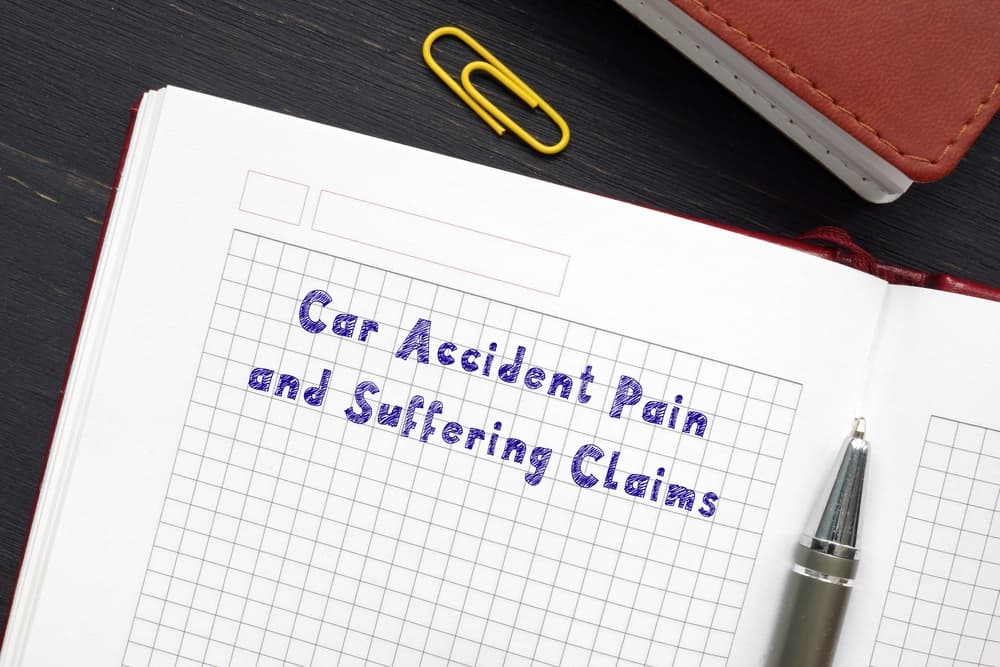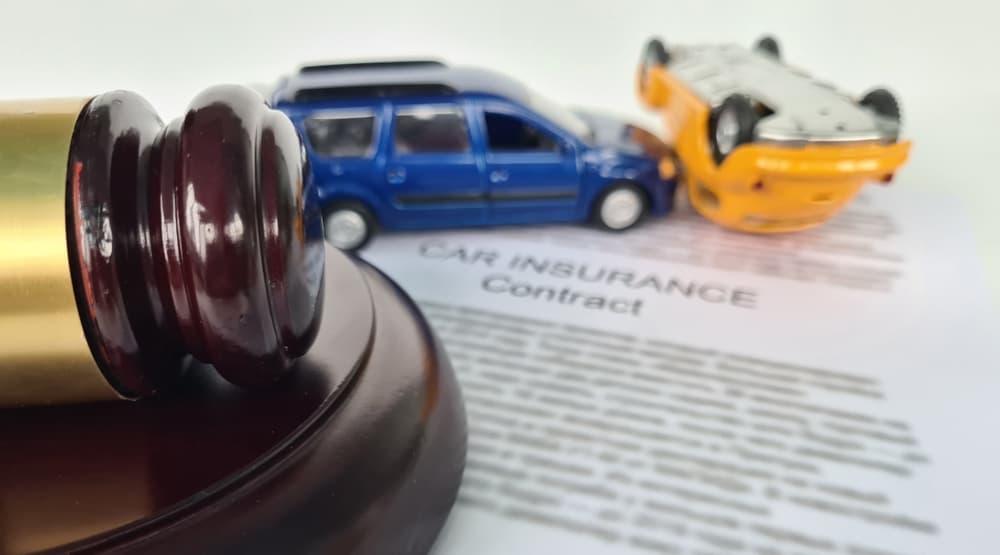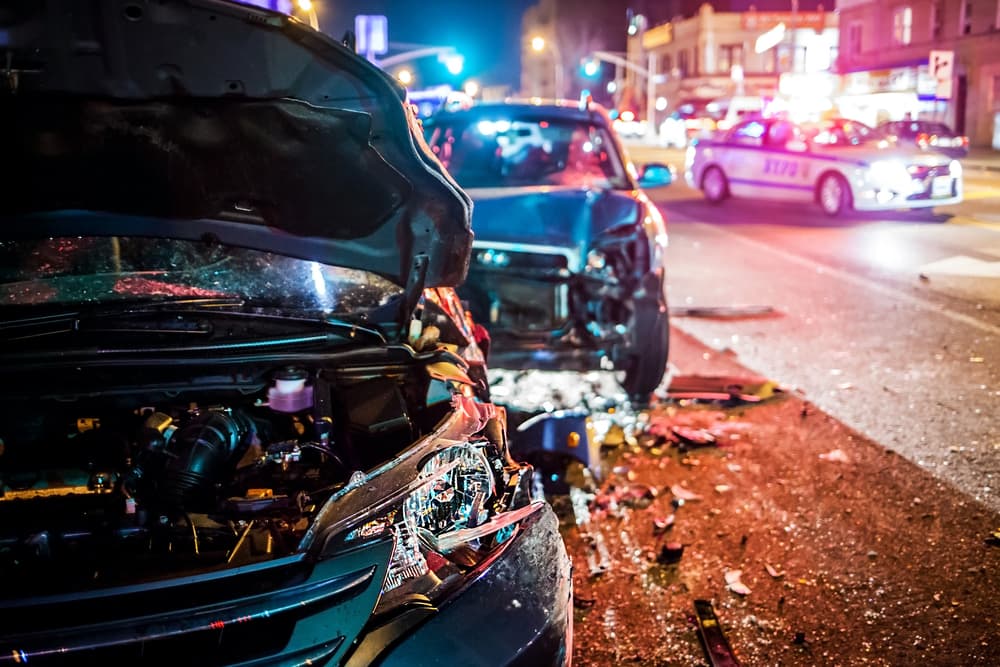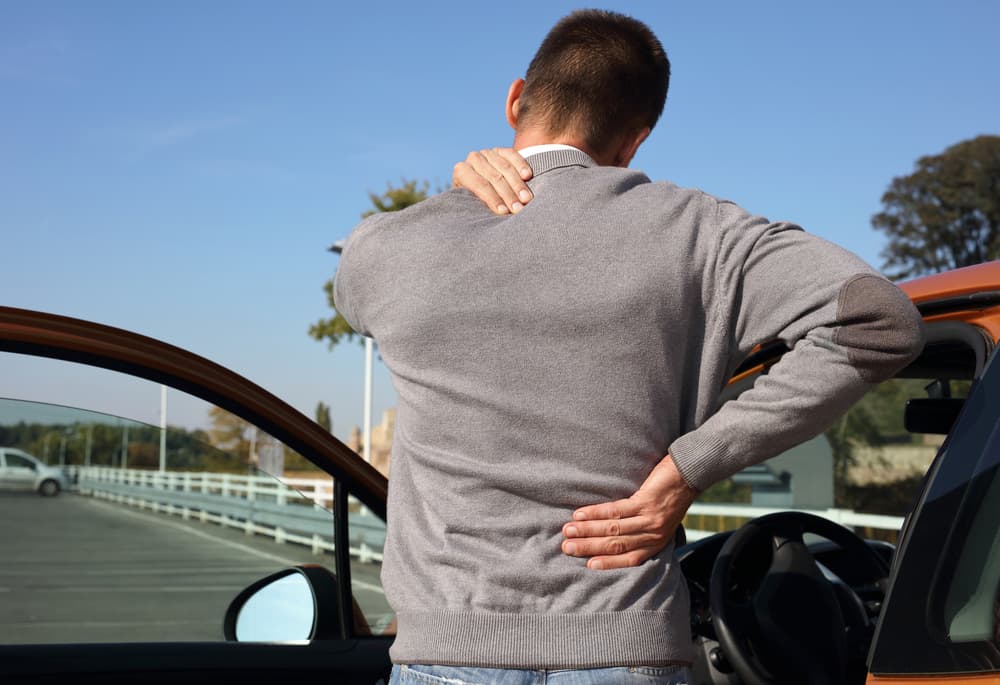Pain and suffering damages in a car accident case refer to the compensation awarded for the physical and emotional distress resulting from the accident. These damages go beyond the direct costs of medical bills and lost income, aiming to address the more subjective and personal effects of the collision.
Physical pain includes any ongoing discomfort, chronic pain, or physical limitations resulting from injuries. Emotional suffering encompasses the mental anguish, anxiety, depression, and loss of enjoyment of life that the victim experiences.
Calculating these damages is complicated, often requiring detailed documentation and expert testimony to quantify the effects on the victim’s life. Courts and insurance companies consider the severity of injuries, length of recovery, and changes to the victim’s daily activities.
If you experienced pain and suffering due to injuries in a car accident, a skilled car accident attorney in your area can handle every step of the process for you. Your lawyer can file a claim with the appropriate insurance company on your behalf, negotiate for fair settlement compensation, or litigate your case to a swift resolution in the state court system.
Total Compensation in a Car Accident Case in SC

Victims of a car accident can seek various types of compensation through a claim or lawsuit. Some of the most common types include:
- Medical Expenses – This is one of the most straightforward types of compensation. It covers the cost of medical treatment related to the accident. This includes hospital stays, surgeries, doctor visits, medication, physical therapy, and any future medical care needed due to the injuries.
- Lost income – If the accident causes you to miss work, you can claim compensation for lost earnings. This includes the income you would have earned while out of work. If the injuries result in long-term or permanent disability affecting your ability to earn in the future, you may also seek compensation for your loss of earning capacity.
- Property Damage – This covers the cost of repairing or replacing your vehicle and any other personal property damaged in the accident. If your car is totaled, you can receive compensation equivalent to its market value before the collision.
- Pain and Suffering – This type of compensation is less tangible and more subjective. It accounts for the physical pain and emotional distress you experience due to the accident. Factors like the severity of injuries, recovery time, and the overall effect on your well-being are considerations when determining the amount.
- Emotional Distress – Separate from pain and suffering, emotional distress covers psychological effects such as anxiety, depression, and trauma that arise from the accident. This may require documentation from mental health professionals to substantiate the claim.
- Loss of Consortium – If the accident negatively affects your relationship with your spouse, such as causing a loss of companionship or affection, you may be entitled to compensation for loss of consortium. The uninjured spouse typically makes the claim for this type of damage.
- Punitive Damages – In cases where the at-fault party’s (defendant’s) actions were particularly reckless or malicious, the court may award punitive damages. These punish the defendant and prevent similar actions in the future. Punitive damages are less common and usually require a high burden of proof.
- Miscellaneous Costs – This can include other expenses arising from the car accident, such as travel expenses for medical treatment, home modifications needed to accommodate disabilities, and hiring help for household chores you can no longer perform.
Factors that May Affect a Pain and Suffering Award
Several key factors come into play when determining the amount of a pain and suffering award in a car accident case. These factors help quantify the accident's physical and emotional effects on the victim’s life.
- Severity of Injuries – The more severe the injuries, the higher the pain and suffering compensation will likely be. Serious injuries such as broken bones, spinal cord injuries, and traumatic brain injuries typically result in larger awards due to the intense pain and long recovery periods.
- Duration of Recovery – The time it takes for a victim to recover from their injuries significantly affects the award. If the recovery is prolonged or the injuries result in permanent disability, the pain and suffering award will generally be higher to account for the extended distress and lost quality of life.
- Effects on Daily Life – How the injuries affect the victim’s ability to perform daily activities is crucial. If the injuries prevent the victim from enjoying hobbies, engaging in social activities, or performing basic tasks, the compensation will likely be higher. The degree to which the victim’s normal routine is disrupted is also a key consideration.
- Medical Treatment – The type and extent of medical treatment required can also influence the award amount. Extensive treatments such as surgeries, long-term physical therapy, and ongoing medical care highlight the severity of the injuries and the associated pain and suffering.
- Emotional Distress – The psychological effect of the accident, including anxiety, depression, and post-traumatic stress disorder (PTSD), plays a significant role. Evidence from mental health professionals can substantiate claims of emotional distress, leading to higher awards.
- Evidence and Documentation – Detailed documentation of injuries, medical treatments, and personal accounts of pain and suffering can further strengthen the claim. Photographs of injuries, medical records, and personal diaries outlining the daily struggles faced due to the injuries provide compelling evidence.
- Credibility of the Victim – The credibility and demeanor of the car accident victim can also influence the award. Consistent and forthright testimony can positively affect the judge or jury’s perception and the resulting compensation.
Common Causes of Car Crashes
Car accidents often occur due to the negligent acts of other drivers, meaning that they fail to exercise reasonable care while driving. Here are some of the most common causes of such accidents.
- Distracted Driving – This is one of the leading causes of car accidents. Drivers can become distracted with various activities, such as texting, talking on the phone, eating, adjusting the radio, or even talking to passengers. These distractions take the driver’s attention away from the road, increasing the likelihood of a collision.
- Speeding – Driving above the posted speed limit is another major cause of car accidents. Speeding reduces the driver’s ability to react quickly to sudden changes in the road or traffic conditions. It also increases the force of impact in a collision, leading to more severe injuries and damage.
- Driving Under the Influence – Alcohol and drugs impair a driver’s judgment, coordination, and reaction times. Driving under the influence significantly increases the risk of accidents because impaired drivers are less capable of making safe driving decisions and controlling their vehicles.
- Reckless Driving – This includes aggressive behaviors such as tailgating, changing lanes without signaling, and running red lights or stop signs. Reckless drivers often disregard traffic laws and the safety of others on the road, leading to dangerous situations and collisions.
- Failing to Yield – Car accidents frequently occur when drivers fail to yield the right-of-way at traffic intersections, pedestrian crossings, and when merging onto highways. This failure can cause collisions with other vehicles and pedestrians with the right of way.
- Running Red Lights and Stop Signs – Ignoring traffic signals is another common cause of accidents. Running a red light or stop sign can result in high-speed collisions – especially at intersections where other drivers or pedestrians are not expecting a vehicle to cross their path.
- Drowsy Driving – Fatigue can affect a driver’s ability to concentrate and react quickly. Drowsy drivers may fall asleep at the wheel or fail to notice important signals and changes in traffic conditions, leading to accidents.
- Improper Turns – Making illegal or improper turns, such as turning without signaling or turning from the wrong lane, can cause accidents. Other drivers and pedestrians may be caught off guard, resulting in collisions.
Types of Car Accidents that Result from Others’ Negligence
Car crashes resulting from the negligence of other drivers can take many forms. Among the most common types are rear-end accidents, sideswipe accidents, head-on collisions, and T-bone accidents:
- Rear-End Accidents – These occur when one vehicle crashes into the back of another. Rear-end collisions typically occur when drivers operate their vehicles too fast for weather or traffic conditions or engage in distracted driving behaviors.
- Sideswipe Accidents – In a sideswipe accident, the sides of two vehicles come into contact. These accidents often occur when drivers change lanes without checking their blind spots or fail to stay in their travel lane.
- Head-On Collisions – These are among the most dangerous types of car crashes. A head-on collision occurs when the front ends of two vehicles collide. These accidents often result in severe injuries or fatalities due to the combined speeds of both vehicles. They typically occur when a driver fails to watch the road attentively or operates their vehicle while under the influence of alcohol or drugs.
- T-Bone Accidents – Also known as side-impact or broadside collisions, T-bone accidents happen when the front of one vehicle crashes into the side of another, forming a “T” shape. These accidents frequently occur at traffic intersections where one driver negligently fails to yield the right-of-way. T-bone collisions can be particularly dangerous for passengers on the side of the impacted vehicle, as there is less space to absorb the impact compared to the front or rear of the car.
Common Injuries in a Car Accident Case
Car accidents resulting from someone else’s negligence can lead to a variety of injuries, both physical and mental. Some of the most common types include:
- Whiplash
- Broken bones
- Traumatic brain injuries (TBIs)
- Spinal cord injuries
- Internal bleeding or organ damage
- Open cuts and lacerations
- Emotional and psychological injuries (including post-traumatic stress disorder – or PTSD)
- Soft tissue injuries
An experienced car accident lawyer can handle the legal steps of your claim or lawsuit while you focus on making a full medical recovery.
How to Prove a South Carolina Car Accident Case Successfully

Proving the legal elements of a car accident case successfully involves demonstrating that the other driver was at fault and that their negligence caused your injuries. Here are the key elements you need to prove and how to do it:
- Duty of Care – First, you must show that the other driver owed you a duty of care. This is typically straightforward, as all drivers are expected to drive safely and follow traffic laws. To establish this, you can refer to traffic regulations and the general rules that apply to all drivers.
- Breach of Duty – Next, you need to prove that the other driver breached their duty of care. This means showing that they did something wrong or failed to act as a reasonable driver would have acted in the same situation. Evidence such as police reports, eyewitness statements, and traffic camera footage can be crucial here. For instance, if the other driver was speeding, ran a red light, or was distracted, these are clear breaches of duty.
- Causation – After establishing a breach of duty, you must demonstrate that this breach directly caused the accident and your injuries. This is often the most challenging part. You must show a clear link between the other driver’s actions and the crash. Accident reconstruction experts can help explain how the crash occurred, while medical records can show that your injuries are consistent with the accident. Witness testimony can also support your case by providing an independent account of what happened.
- Damages – Finally, you must prove that you suffered actual damages due to the accident. Damages can include medical expenses, lost income, property damage, and pain and suffering. Collecting and organizing all related bills, receipts, and financial statements is essential. Medical records, repair estimates for your vehicle, and documentation of missed work can help substantiate your claim for damages.
By systematically proving these elements, you can build a compelling case demonstrating the other driver’s negligence and securing the compensation you deserve.
Speak with a Knowledgeable South Carolina Car Accident Lawyer Near You Today
Car accidents frequently come with extensive pain, suffering, and inconvenience. A skilled personal injury attorney in your area can file a claim or lawsuit and pursue the compensation you deserve for your pain, suffering, and inconvenience.
Seek your free consultation with a trusted law firm today.







